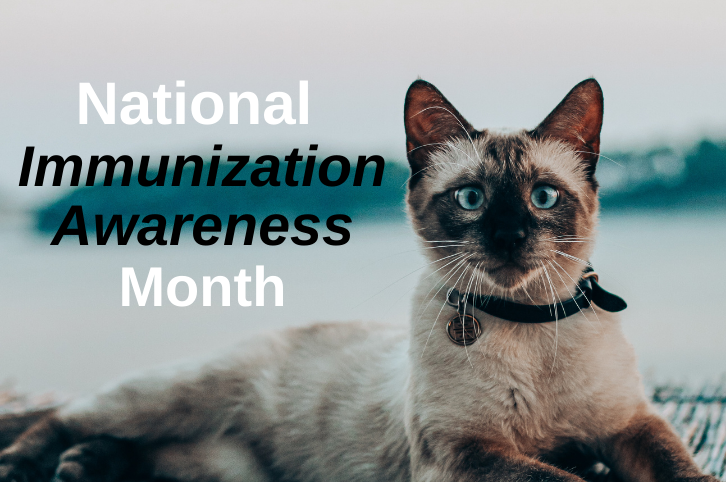August. Heat, humidity, and Veterinary National Immunization Awareness Month! Thinking about your pet’s immunizations this month certainly gives a new meaning to the term “dog days of summer”. The dog days of August are a prime time to think about protecting your pets from many illnesses, including those that spread through contact with specific pathogens found outdoors. Leptospirosis, a bacteria that spreads to dogs through contact with soil and water that has been infected by wildlife, is a prime example of a disease that can be prevented through vaccines. Lyme disease is another vaccine-preventable disease that may be contracted by pets.
Reasons to Vaccinate
Keeping your pet healthy is of paramount concern to most pet owners. There are several reasons to vaccinate your pet, including:
- Illness prevention
- Helping a pet owner avoid costly treatments for preventable diseases
- Preventing diseases that can be passed between animals
- Preventing diseases that can be passed from animals to people
- Preventing the spread of diseases prevalent in wildlife, such as rabies and distemper, to unvaccinated pets
- Local and/or state laws regarding required vaccines
While vaccinating your pet increases their protection from preventable illnesses, it also protects you and your family from zoonotic diseases or diseases that can be passed from animals to humans. Leptospirosis, mentioned above, is one example of a zoonotic disease. It can be extremely serious in both dogs and humans, potentially inflicting kidney and liver damage, meningitis, respiratory distress, or even death upon those infected by it.
Types of Vaccines
There are two types of vaccines: core and lifestyle. Core vaccines for dogs include canine distemper, parvovirus, and rabies. Core vaccines for cats include feline distemper and rabies. Lifestyle vaccines can be administered to your pet if their lifestyle supports it. Lifestyle vaccines will be recommended depending on the amount of time your pet spends outside and how many contacts they have with other animals. Examples of lifestyle vaccines are Bordetella, leptospirosis, Lyme disease, canine influenza, and feline leukemia.
Magnolia Springs Veterinary Clinic’s Approach to Vaccination
As part of our commitment to your pet’s wellness, we provide all the vaccinations listed above as needed for your pet. Puppies and kittens should receive their first set of vaccines by the age of eight weeks and will be put on a schedule of vaccine boosters to meet the needs of your furry family members.
Up-to-date rabies vaccines are required by law for all dogs and cats (with exemptions for those animals with specific health conditions). However, we approach the care we provide for your pet in a very individualized way, based upon what is needed and best for them. To accomplish that, we offer and recommend vaccine titers. A vaccine titer is measured through a blood sample and checks on the levels of vaccine antibodies in your pet’s body. The results of the vaccine titer will determine whether annual vaccinations are necessary, or if your pet will be sufficiently protected against a disease for an additional year before they need to be vaccinated again. This protocol is appropriate for any pet who has received a proper vaccination protocol as a puppy or kitten.
In adopting the approach of using titers instead of only administering vaccines to your pet, we can customize the care we provide for each of your four-legged friends. Individualized, holistic care for your pet means your animal companion is receiving exactly the care they need, leaving you both free to enjoy these summer days safely and to their fullest.
Image credit: Pexels

